THIS MONTH’S NEWS
February Field Projects Special Issue—Community Based Adaptation to Climate
Mali | Abkhazia | India | Pakistan | Ethiopia | Tanzania | Iran
Here is a sample of CSDi partner field projects that include Community Based Adaptation to Climate Change programs. It’s very interesting to notice that although these projects are from different parts of the world, these communities suffer from many of the same challenges. It is also interesting to note that although these partners have included similar types of programs in their projects, each program is customized to best fit their specific context, location and cultural norms.
| 1. Mali |
Family members from 387 families Sodieni will be food secure. |
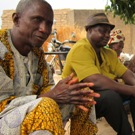 |
3096 family members from Sodieni run short of food due to insufficient and erratic rainfall. Walter Sissoko, Ife Olabampe and Stacey Sawchuck’s project will help their community members become food-secure and wealthy enough to rise out of extreme poverty. Their project includes the following programs:
|
| 2. Abkhazia |
1163 family members from Pichouri will increase agricultural productivity and incomes. |
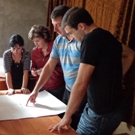 |
The majority of the 279 families in Pichouri are suffering from a decrease in agriculture production due to obsolete irrigation systems and a lack of knowledge of improved agricultural practices. Edgar Barata and Marnie Cunningham’s project will help their community members increase both agricultural production & employment levels. Their project includes the following programs:
|
- See photos in these documents
- See their participatory needs assessment
- See their project outline
- See their project logframe
| 3. India |
1000 islanders in Goa India will enjoy increased crop yields—Climate Smart Agriculture. |
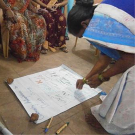 |
1000 Community members from the Island community of Chodan village in Goa, India are suffering from low crop yields caused by disturbed rainfall patterns and a rise in sea levels that increase salinity on agricultural land. Ruchita Khurana’s project will help the islanders increase productivity through a climate smart agricultural program leading to increased food security. Her project includes the following programs:
|
- See photos in these documents
- See her participatory needs assessment
- See her project outline
- See her project logframe
| 4. Pakistan |
100 families in Jaffarabad Pakistan will have flood resilient shelter and food security. |
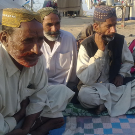 |
These families are living in the open or in tents due to climate change related flooding, and are suffering from shortages of food due to flood damage to crops. Rehmat Durrani’s project will help his community members access flood resilient shelter and enjoy food security. His project includes the following programs:
|
| 5. Ethiopia |
1265 families in Addis Ababa will enjoy increased incomes, crop productivity & food security. |
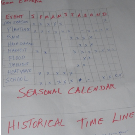 |
These community members suffer from chronic poverty and from reduced crop harvests due to erratic rains linked to climate change. These challenges affect their health and impact food security. Alem Adela and Conrd Otterness’s project will help their community members increase income levels and agriculture production. Their project includes the following programs:
|
| 6. Tanzania |
600 families in Nyange Tanzania will be able to access product markets & improved crops. |
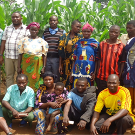 |
These community members in Tanzania are suffering from low incomes, poor access to product markets, and climate change related events that have reduced crop harvests. Mohamed Semdoe’s project will help their community members increase income levels and increase crop harvests. Their project includes the following programs:
|
| 7. Iran |
200 families in Iran will be free from pollution and enjoy economic viability. |
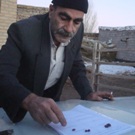 |
These community members are suffering from pollution due to a malfunction of sewage filtration systems and are also suffering from economic weakness caused by problematic agriculture due to drought. Said’s project will help his community members increase health levels and increase crop harvests. Their project includes the following programs:
|
- See his participatory needs assessment
- See his project outline
- See his logframe
Contact Us to learn more about your organization joining our field partner program.
March Training in Project Design for:
Nonprofits | International Development | Climate Change | Nutrition | Agriculture | Water Management
Nonprofits | International Development | Climate Change | Nutrition | Agriculture | Water Management
The following programs provide the training, materials, guidance, mentoring and expert consultancy to allow you to develop projects like the examples above in your own country. Participants develop real projects in real communities and complete the programs with the tools necessary to both manage the projects and approach donors.
Programs in English & Español
| Spring Quarter | Distance Learning Courses Begin March 4. Haga click aquí para Cursos en Español. |
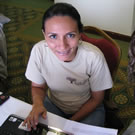 |
Are you interested in:
|
We’ve trained development professionals from 500 organizations in 153 countries to develop projects impacting over 400,000 people. Student projects have utilized 270 different kinds of solution-oriented activities to address community need. Scan the list to see which would work best for your project.
We look forward to working with you in our training programs.
Sincerely,
Tim Magee, Executive Director
Tim Magee is the author of A Field Guide to Community Based Adaptation published by Routledge, Oxford, England.
Like us: CSDi Facebook.
Learn more about design and implementing Community Based Development Projects.
Learn more about design and implementing Community Based Development Projects.
Would you like to subscribe to this newsletter?
If you have a question don’t hesitate to contact us at: Online.Learning@csd-i.org.
The Center for Sustainable Development specializes in providing sound, evidence-based information, tools and training for humanitarian development professionals worldwide. CSDi is a 501(c)(3) nonprofit organization.